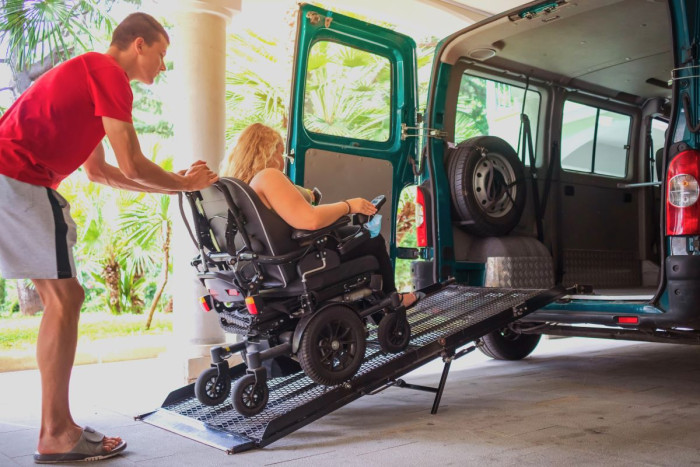Support Worker
Kaiāwhina Tiaki Tangata
Alternative titles for this job
Support workers help people with health problems or disabilities to do daily tasks, such as housework, and be as independent as possible.
Pay
Support workers usually earn
$24-$28 per hour
Source: Te Whatu Ora, 2023.
Job opportunities
Pay
Pay for support workers varies depending on experience and qualifications.
- Support workers with up to eight years' experience, or a Level 2 qualification, usually earn $24 an hour.
- Those with over eight years' experience, or a Level 3 or 4 qualification, usually earn $26 to $28 an hour.
Support workers may need to supply their own vehicle to travel between clients, and pay for running costs such as fuel and maintenance.
Source: Te Whatu Ora, 'Support Workers' Minimum Wage Rates Update from 1 July 2023', 12 August 2023.
- Te Whatu Ora website - Support Workers' Minimum Wage Rates Update
- PAYE.net.nz website - use this calculator to convert pay and salary information
(This information is a guide only. Find out more about the sources of our pay information)
What you will do
Support workers may do some or all of the following:
- help clients set and achieve goals such as avoiding drugs
- help clients wash, dress, toilet, and do housework, shopping and budgeting
- take clients on outings and help them keep fit
- make sure clients take the right medicines
- accompany clients to court, Work and Income, health and other appointments
- help clients find accommodation or employment
- help clients apply for assistance such as ACC funding
- assist clients with limited mobility such as by using mobility hoists to help them get out of bed
- drive clients with limited mobility in vehicles that can take wheelchairs
- advocate for clients by speaking up for them
- support clients' families by listening to them and giving advice on how they can be supportive.
I work one-on-one with clients, facilitate support groups, and sometimes support clients when they engage with other services such as courts, Oranga Tamariki and housing services.

Byron Vili
Alcohol and Other Drug Peer Support Worker/Group Peer Support Worker
Skills and knowledge
Support workers need to have:
- a good understanding of the mental, social or physical difficulties their clients experience
- knowledge of how to access services, such as housing, for their clients
- knowledge of how to help clients become as independent as possible
- knowledge of relevant laws such as the Human Rights Act
- ability to speak up for their clients
- ability to keep records such as case notes
- ability to operate equipment such as mobility hoists.
Working conditions
Support workers:
- may work shifts, including nights and weekends, and may sleep over at clients' homes to help at night-time
- usually work in clients' homes, including group homes
- may drive their clients on local outings or to attend appointments.
What's the job really like?

Byron Vili
Alcohol and Other Drug Peer Support Worker/Group Peer Support Worker
What do you do in your job?
"My role is to offer a non-judgemental, empathetic connection to people recovering from addiction, and to show them change is possible – despite the challenges.
"I may be working with one client or running a support group.
"My job gives purpose to my own addiction and recovery. It’s become a way to connect with other tāngata whai ora [people seeking wellness]."
How do you manage the stress of the role?
"It can be emotionally demanding. I’m often exposed to behaviours and ideas that can trigger my own issues. To do this work you need to feel confident about your own recovery, and have the ability to reflect on your own behaviour and ask for help.
"I find support in recovery communities. These often include people I work with, so there’s an overlap between my work and my private life, which I have to manage."
Is this a full-time job?
"Peer support roles are often part time. You may have to work more than one role to make up full-time employment, or depend on other financial support."
What do you like most about your job?
"Although my work life can be demanding, I’ve found a peer support role incredibly rewarding, and it’s a safe work environment for me on my own journey of recovery."
Entry requirements
There are no specific requirements to become a support worker as you gain skills on the job. However, many employers prefer to hire support workers who:
- have successfully overcome issues similar to those of the people they work with (lived experience)
- can pass a police check
- have a driver's licence.
Employers often help you to gain one of:
- Peer Support 101 – Introduction to Lived Experience Peer Support in Addiction Micro-credential (Level 3)
- New Zealand Certificate in Health and Wellbeing – Social and Community (Level 4)
- New Zealand Certificate in Health and Wellbeing – Peer Support (Level 4).
These qualifications may be available as apprenticeships. Careerforce oversees support workers' apprenticeships.
- Careerforce website - support worker apprenticeships
- Careerforce website - support worker qualifications
- Odyssey website - Peer Support 101 – Introduction to Lived Experience Peer Support in Addiction Micro-credential
- More information about apprenticeships
The Vulnerable Children Act 2014 means that if you have certain serious convictions, you can’t be employed in a role where you are responsible for, or work alone with, children.
Secondary education
No specific secondary education is required for this job, but English, maths, social studies, health education and biology to at least NCEA Level 1 are useful.
For Year 11 to 13 learners, the Gateway programme is a good way to gain relevant experience and skills. This programme may help you gain an apprenticeship, but will not reduce the amount of time it takes to complete it.
Personal requirements
Support workers need to be:
- patient and adaptable
- practical, organised and responsible
- friendly and helpful
- able to relate to people from a range of cultures and backgrounds
- good at solving problems
- able to work well under pressure
- able to keep information private.
Useful experience
Useful experience for support workers includes:
- work in rest homes, nursing homes and hospitals
- work with people who have mental, social or physical difficulties.
Physical requirements
Support workers need to:
- have clear speech and good hearing so they can communicate with their clients
- be reasonably fit, healthy and strong, as they may need to help their clients move around, or exercise with their clients.
Find out more about training
- Careerforce
- 0800 277 486 - info@careerforce.org.nz - www.careerforce.org.nz
- Odessey
- 09 638 4957 - www.odyssey.org.nz
What are the chances of getting a job?
High demand for support workers
Chances of getting a job as a support worker are good due to:
- increased government funding for support work, which means more jobs
- an ageing population, which means more people have health problems and need support
- an ageing workforce, with many reaching retirement – most support workers in aged care are between 55 and 64 years old.
According to the Census, 9,888 support workers worked in New Zealand in 2018.
More funding for mental health and addiction support workers
Mental health and addiction support workers are in particularly high demand, with employers reporting a shortage.
This is partly because these workers had lower pay and fewer training opportunities than other support workers.
As a result, since 2018 the Government has provided:
- $173 million to bring mental health and addiction support workers' pay in line with other support workers, and reduce staff turnover
- a training grant for NZQA-approved mental health and addiction studies at Levels 4 to 6.
Types of employers varied
Most support workers are employed by:
- district health boards
- charitable and non-profit agencies such as Odyssey House, Mind and Body Consultants, The Salvation Army and CCS Disability Action.
Sources
- Careerforce, careers.govt.nz interview, November 2019.
- Careerforce, 'Mental Health Training Grant', accessed December 2019, (www.careerforce.org.nz).
- Hennessy, J, 'The Contribution of the Mental Health Support Worker to the Mental Health Services in New Zealand – An Appreciative Enquiry Approach', 2015, (openrepository.aut.ac.nz).
- McBeth, P, 'Healthcare NZ pays $51.9M for Rival Geneva Healthcare', 3 April 2018, (scoop.co.nz).
- Ministry of Health, 'Mental Health and Addiction Support Workers Pay Equity Settlement', accessed December 2019, (www.health.govt.nz).
- Newshub, 'Mental Health and Addiction Support Workers to Get Pay Equity', 22 June 2018, (www.newshub.co.nz).
- Odyssey, 'Annual Review – Arotake ā-tau 2018', accessed January 2020, (www.odyssey.org.nz).
- Radio New Zealand 'Addiction Sector Facing Workforce Shortage, Growing Wait Times', 5 December 2019, (www.rnz.co.nz).
- Stats NZ, '2018 Census Data', 2019.
- Te Pou o te Whakaaro Nui website, accessed December 2019, (www.tepou.co.nz).
- Te Tumu Waiora website, accessed December 2019, (www.tetumuwaiora.co.nz).
- The Treasury, 'The Wellbeing Budget 2019', accessed December 2019, (www.treasury.govt.nz).
(This information is a guide only. Find out more about the sources of our job opportunities information)
Progression and specialisations
With extra training, support workers may progress to managerial, training or education roles.
Support workers may specialise in working with people who have:
- intellectual or physical disabilities
- injuries
- addiction and mental health problems
- dementia
- family/whānau problems
- housing problems.
Last updated 25 March 2025

